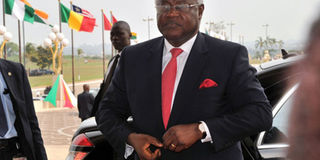Sierra Leone leader misses London Ebola talks after plane break-down

Sierra Leone President Ernest Bai Koroma arrives for the 44th ordinary summit of the Economic Community of West African States (ECOWAS) Heads of State, at the Felix Houphouet-Boigny Foundation centre in Yamoussoukro, Ivory Coast, on March 28, 2014. President Koroma failed to attend an international conference held in London on October 2, 2014 because of a plane break-down. FILE PHOTO | AFP
What you need to know:
- The aim of the London conference is to raise awareness of the scale of the outbreak in Sierra Leone, where Britain has taken the lead in fighting the deadly virus sweeping across West Africa
- Britain has pledged £120 million (KSh6.7bn) to help build an estimated 700 treatment beds, fund new community treatment centres, support existing public health services and support aid agencies
- President Ellen Johnson Sirleaf said she had told Dr Banbury the virus had spread to all 15 counties of Liberia, the worst-hit nation with almost two-thirds of the 3,338 deaths in west Africa
LONDON
Britain hosted an international conference on Thursday to help organise the fight against Ebola in its former colony Sierra Leone, but the African nation’s president could not attend because his plane broke down.
President Ernest Bai Koroma was due to be the guest of honour at the half-day meeting, which will bring together ministers, diplomats and health officials from around 20 different countries and world organisations.
“Unfortunately the president of Sierra Leone is now unable to take part in the Defeating Ebola Conference,” a Foreign Office spokesman told AFP.
“The chartered plane he was scheduled to fly on experienced significant technical difficulties prior to take off.
“We are currently exploring alternative ways for the president to participate in the conference.”
The spokesman would not confirm reports by the BBC that the plane had been sent by Britain, saying it had been chartered by Sierra Leone.
RAISING AWARENESS
The aim of the London conference is to raise awareness of the scale of the outbreak in Sierra Leone, where Britain has taken the lead in fighting the deadly virus sweeping across West Africa.
Britain has pledged £120 million (KSh6.7bn) to help build an estimated 700 treatment beds, fund new community treatment centres, support existing public health services and support aid agencies.
Meanwhile, the UN launched a mission on Thursday to prevent the worldwide spread of Ebola as the US hunted for people who came in contact with the first African diagnosed with the deadly virus outside the continent.
Dr Anthony Banbury, the special representative for the UN Mission on Ebola Emergency Response (UNMEER), was expected to set ambitious targets for action on the crisis as he began a tour of the three worst-hit nations in the Liberian capital Monrovia.
President Ellen Johnson Sirleaf said she had told Dr Banbury the virus had spread to all 15 counties of Liberia, the worst-hit nation with almost two-thirds of the 3,338 deaths in west Africa.
“Affected people are leaving from urban places and hiding out in remote communities,” Dr Sirleaf said, according to a statement from the presidency following the meeting on Wednesday.
“If we do not move in as quickly as possible, the virus (will) further spread in rural areas.”
EBOLA SUSPECT
Banbury was due to address the media before moving on to Sierra Leone and then Guinea over the coming days, with US health officials scouring the Dallas area for people who came in contact with a Liberian man diagnosed with Ebola.
The man first sought treatment in Texas on September 25 but hospital officials have admitted he may have come into contact with many more people than first thought because an apparent miscommunication among staff resulted in his release back into the community for several days.
The man — the first person to be diagnosed with Ebola on US soil — flew from Liberia, the hardest-hit nation in west Africa’s deadly Ebola outbreak, and arrived in Texas September 20 to visit family.
He fell ill on September 24.
He went to the hospital the next day but was sent home because the medical team “felt clinically it was a low-grade common viral disease”, said Mark Lester, executive vice president of Texas Health Resources.





